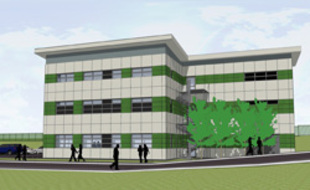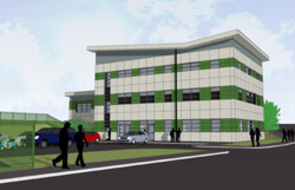24 July 2012
Yorkon Awarded £3m Contract to Provide 5 Buildings for New Network Rail Depot
As part of the £850m redevelopment of Reading Station, construction of a train care depot is now underway by contractor VolkerFitzpatrick in a £36m contract. Off-site specialist, Yorkon has been appointed by Network Rail to provide five buildings for the new depot.
Every day over 50,000 people use Reading Station and more than 700 trains pass through it. Passenger numbers are set to double by 2030 and freight business has increased by 60 per cent - making Reading one of the busiest and most important rail hubs in the country.
The aim of the overall redevelopment project is to improve train speeds as they pass through the station, which was originally designed by Brunel, and to reduce delays while trains wait for vacant platforms or for conflicting train movements to be completed.
The new depot is being moved to the west of Reading Station and will be operational by 2013. The existing train care depot is having to be demolished to make way for new lines to accommodate freight traffic, which will pass under the main lines to continue through the station area without impacting on other trains.
Yorkon is providing a three-storey depot administration building, two ancillary buildings for train maintenance and cleaning staff, a security gate house, and a further train care accommodation building. The steel-framed modules for each building are being manufactured and fitted out off site at the Yorkon factory in York to minimise disruption on this very busy site. The off-site approach will also reduce the programme time as the depot construction project affects the critical path of the overall station redevelopment.
Each building will have a mono-pitch roof and has been designed to stringent Network Rail standards, which include low smoke and fume cables and rainscreen cladding for impact protection. The main office building will also have a station-specification lift, feature windows and an architectural 'butterfly wing' roof.
Commenting on the project, Simon Ambler, Director of Yorkon said, "We were delighted to be nominated by Network Rail to contribute to this hugely important project and are working closely with main contractor VolkerFitzpatrick. This has to be one of the most extensive and complex construction sites in the UK so collaborative working is essential at every stage."
"The off-site construction solutions we developed with Jacobs Engineering, who designed the new depot, will contribute to the aim of reducing the overall station redevelopment programme by 18 months through stimulating innovation."
"And by moving work into the factory for the construction of these five buildings, we will be reducing the number of operatives and subcontractors on the depot site, which will have a positive impact on health and safety, and provide Network Rail with certainty of delivery on time and on budget."
The new depot will maintain and service the existing rolling stock and will provide future capacity for the expansion of the rail network in the south west, which will include the new Intercity Express trains.
Yorkon is a market-leading supplier of off-site building solutions across the public sector, which includes transport, airports, health and education. It provides bespoke steel-framed buildings, which are manufactured off site in significantly less time, with less disruption and less impact on the environment. Its projects have been recognised by numerous independent awards and accolades for design, build quality, project performance and health and safety.
Over the past six years Yorkon has delivered 96 per cent of its building projects on time and 94 per cent on budget, rising to a staggering 99 per cent for the last two years - well in excess of construction industry averages.
Yorkon is part of the Portakabin Group.
For further information about Yorkon off-site building solutions, call 0845 2000 123, email info@yorkon.com or visit www.yorkon.info.
Editor's Notes
The advantages of off-site construction include:
- Programme times reduced by up to 50 per cent for earlier handover and occupation
- Reduced disruption with safer, quieter and cleaner construction
- A robust pre-installed concrete floor option for enhanced performance for high traffic areas
- Buildings can be easily extended vertically or horizontally and expanded without decanting
- Material wastage reduced by up to 90 per cent
- Up to 90 per cent fewer vehicle movements to site
- Improved quality and reduced future maintenance
- A high level of design flexibility internally and externally
- Improved thermal efficiency for lower running costs and reduced carbon emissions
- Greater assurance of delivery on time and on budget.


